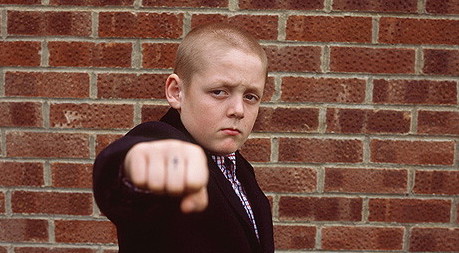Quentin Tarantino‘s love for Spaghetti Westerns is well-known. Time and again, elements of Spaghetti Westerns have found a reference in his works. For instance, Ennio Morricone‘s L’arena which plays while Paco faces off against Curly in The Mercenary (1968), is adapted well into the Bride’s attempt to free hserself from the coffin in Kill Bill Vol. 2 (2004).
Django Unchained (2012) is a Tarantinoesque take on slavery in the deep south. It has elements of tribute to Spaghetti Westerns (such as musical scores and certain shots) and other exploitation cinema, but essentially Django Unchained is its own Western.
While there are some dodgy actions on the part of its protagonists, they aren’t amoral like most ‘heroes’ from Spaghetti Westerns. Calvin Candie (Leonardo DiCaprio) is a villain because he degrades other human beings and treats them in the most despicable manner based on the color of their skin, unlike the capitalist and big landlord villains present in several Spaghetti and Zapata Westerns, who might be vile racists but their evil is a function of their economic position in the society. The monetary motivation, which was often so-central to the plot of several Spaghetti Westerns (Dollars trilogy, Sergio Corbucci‘s Django), is present (Candy is enticed with the big price that King Schultz wants to pay for his Mandingo) yet it isn’t the main plot-point.
The movie has more to do with Django’s self-discovery, the quest for his beloved wife, and the revenge he takes on those who have wronged him.
Django Unchained is a modern movie created for the sensibilities of a modern audience, rather than being a deep study into the circumstances of the deep south in the late 1850s. This doesn’t mean that the director doesn’t tackle issues of race and human relations. But the entire story gets a ‘Tarantino’ treatment.
The two protagonists in the film, Dr. King Schultz (Christopher Waltz) and Django (Jamie Foxx), are created in a manner so that they can appeal and be relatable to the modern-day audience. This is done because the story Tarantino intends to tell isn’t a pleasant one.
The movie shows a graphic depiction of violence against black Americans and the use of racial slurs against them. The Mandingo fight sequence and the dog-attack scene are particularly unsettling but expected in a Tarantino movie. However, the racial basis behind these actions makes them all the more unpleasant.
Dr. King Schultz is a German bounty hunter, who is disgusted by the act of slavery and sympathetic to the plight of the slaves. So, he helps free Django, and eventually, they become partners in this bounty hunting enterprise. Finally, he seeks to help Django in his attempt at rescuing his wife.

To some observers, this ‘sympathy’ might seem a bit stretched. While Dr. Schultz is a man of violence, who doesn’t mind shooting down a sheriff in cold blood, but he is visibly horrified at D’Artagnan being ripped apart by the dogs. Initially, he even insists on paying off Candie to save D’Artagnan.
This seems off because the entire purpose of this visit is to free Django’s wife and wrong actions on Schultz’s part are now jeopardizing the mission. Candie notices the perturbed Doctor and asks Django that his boss looks a “little green around the gills” for a man intending to enter the bloody sport of Mandingo fighting.
Django becomes a man of his own after being trained by the doctor. He becomes a skilled bounty hunter and an efficient partner in Schultz’s enterprise. His main purpose in life is to return to his wife. Through his visit to the Candyland estate, he keeps on getting visions of her and dreams of meeting her soon.
However, he isn’t too far behind in setting off the alarm bells going at Candyland. He is supposed to be an expert on Mandingoes but there are occasions when he pushes his luck.
He is quick to antagonize Calvin Candie and others in his estate at various stages in the movie, including talking to Calvin as if he’s commanding the owner of this plantation “Now, Monsieur Candie, whenever you’re ready. We rode five hours so you could show off your stock. Let’s get to it.”
While, these sequences help in building the ‘cool’, ‘don’t-give-a-damn’ Tarantino characters who aren’t ready to accept the injustices in their life, they also create the problem of characters not adhering to their own stated goals. Wouldn’t the doctor have expected to see violent instances of abuse against the slaves when he was going in with the ‘charade’ of buying a ‘Mandingo’ slave to a person who is known for enjoying such fights? Django has become a man of his own, however, why is he trying to get ahead of himself and boss around others at a time when he hasn’t even found his wife, who is the very reason for him being there in the first place?
The movie tries to deal with this paradoxical situation cleverly.
Dr. Schultz’s reaction can be explained by his convictions and beliefs. Initially, it seems that he is someone who is facilitating the setting up of Django’s story for us, but gradually we realize that his motivations are far deeper. He has a strong hatred for the act of slavery itself.
Although, a German who is an outsider to the American system, his character is perhaps Tarantino’s take on the Europeans who settled in the new world. (Interestingly, Franco Nero‘s character is an Italian named Amerigo Vessepi, perhaps a take on Amerigo Vespucci)
He may also refer to the liberal-minded individuals of the era. He builds on his native folklore and beliefs (The story of Broomhilda) to empathize with Django’s situation (“…when a German meets a real-life Siegfred that’s like a big deal”) and then, promises to help him bring Broomhilda (Kerry Washington) back. When Django asks “Why do you care what happen to me?”, to which Schultz responds “Frankly, I’ve never given anybody their freedom before. And now that I have, I feel vaguely responsible for you.”
This does give one vibe of Kipling’s White man’s burden, wherein the enlightened man is helping out the uncivilized. But Schultz is built more in the mould of John Brown, the abolitionist.
He is disgusted by Calvin Candie’s pseudo-scientific, racist assertions about the white man being the most superior of all races, and reminds him that D’Artagnan, the slave he got killed, was also the name of a character created by Alexandre Dumas. Calvin Candie is a man who presents himself as a great lover of culture and art but has little clue as to what Dr. Schultz is getting at. (A situation not much different from his knowledge of French)

Dr. Schultz tells him that Alexandre Dumas was black.
When he’s uncomfortable at the sight of D’Artagnan’s fate and it is noticed by Calvin Candie, Django comes to his rescue by telling Candie that “No. He just ain’t used to seeing a man ripped apart by dogs is all.”
Django’s conduct can be explained by his rising consciousness as a free man. He has risen to a position where he can equal or even best those white men who consider him to be his inferior. And while rescuing his wife seems to be the priority, he wants to give back the hate that is being inflicted by those around him.
The very fact that he is on a horse and is made to sit as an equal is seen as a great affront to the institution of slavery. (The sequence where Stephen can’t believe Calvin chose to entertain Django in the Big house)
Whenever his conduct raises suspicions among the residents of Candyland, it is shown on the screen. Dr. Schultz, at one point, even warns him against antagonizing Calvin Candie, however, one feels it might also be the case that Dr. Schultz is not happy with the way Django is mistreating the slaves. At another point, the fact that Broomhilda is taking too much interest in Django makes Stephen (Samuel L. Jackson, in perhaps, his best Tarantino appearance) apprehensive.
What remains clear is that Django is no intentional savior or hero of the slaves in the movie. His motivation remains to get back to his wife, while he might be cocky about it, he remains steadfast on his aim. This includes his maltreatment of fellow black men when he’s putting on the act of the sure assistant to Dr. Schultz.
Later when he frees himself from the hands of LeQuint Dickey mining company employees, he doesn’t tell the slaves to free themselves from their wretched chains. This is because even though Django understands that slavery is an unjust institution, he doesn’t have the consciousness of the socio-economic basis of this institution. He goes about killing ‘whites’ because he sees them as his enemies.

In the end, there is a gruesome scene where Django enters the big house and proceeds to kill everyone. He lets go of only two women who are black. His lethal spree includes the murder of Calvin’s sister, Lara Lee (Laura Cayouette), who doesn’t bear any arms or seem like a threat. He perhaps feels that she is responsible for sending him to the mining company (Even though the idea was first suggested by Stephen).
The only black person he kills in the final sequence is Stephen, whom he tells “You are right where you belong.” This is because he hates Stephen for being the right-hand man of Calvin and a perpetrator of further abuse on him and his wife.
Stephen enjoys the benefits of oppression of his own kind and becomes a symbol of disgust for Django. However, Stephen is behaving in this manner because he is at the (relatively) better end of the scale in an inherently unjust institution. Being close to the family means he can berate even the unpredictable Calvin without any repercussions.
What Django fails to see is that even Sheba (Nichole Galicia), possibly a slave and a mistress to Calvin, is also enjoying benefits similar to Stephen even if for a temporary period. She dresses and eats well and sits with Calvin and others at the table. She is at the (relative) right end of the scale as compared to others.
Now, there may be more than one element involved here. There’s a possibility that she too is a victim of sexual exploitation like Broomhilda. She is enjoying the benefits for the time being, but she wouldn’t have many other choices in this setup. The same stands true for Cora, who plays a prominent role in the Candie household, and is also allowed to leave.
Stephen is worse off because he ensures that the system continues to function to his benefit.
Stephen would want Django dead, but neither of the two ladies he let go would be shedding any tears if Django were to die a brutal death.
The fact that Django lets them go, further, reinforces that his fight is one for retaliation, where he sees the world in black-and-white (That is those on his side versus those who demean and threaten to kill him) and not against any institutional malaise. The two ladies didn’t actively or passively conspire to act against him or his wife and thus, are free to go.
The words “You are right where you belong” have more to do with personal retribution that Django seeks to unleash because if he were aware of the socio-economic scales in play, he’d be aware that all three of Sheba, Stephen, and Cora are at the right place. (In the above paragraphs we are analyzing his line of thinking and not deciding alongside Django whom to include or leave in his quest for vengeance!)
Even though Django goes on a killing spree in the end which involves the massacre of white residents in Candyland, it doesn’t feel like he has developed hatred against whites. He might hate the racists who seek to kill him but he feels for the demise of his only ally, Dr. Schultz. Also, he and the doctor seem to be on good terms with Sheriff Gus.

Though he doesn’t want to be a hero, he becomes one when slaves look at him as one of their own taking on their oppressors. Initially, we see a slave scowling at the fact that Django was behaving like their overlord. Later, Django receives a look of approval from the same man, even as he rides off after killing the members of the mining company.
In this manner, Django is a representation of the perfect American hero. The “individual” who stands up for his rights, faces off against the evil and wins the battle alone. Not too different from the “individual” Ethan Edwards in The Searchers (1958), who’d rather wage his ‘personal’ battle against the Comanche alone.
Django Unchained is a story seen through the eyes of its two protagonists. However, the two though sharing similar goals, have different motivations behind them. This isn’t too different from the protagonists John (Sean) and Juan from Sergio Leone‘s iconic Zapata Western Duck, you sucker! (1971). While John seeks to assist the revolution, Juan is only interested in the money, till he too gets entangled in the revolution. But there is a difference.
Dr. King Schultz is a bounty hunter as well as an opponent to a system which claims that one man is superior to another. Yet, he loses his life in an act of fitful anger (leaving Django and Broomhilda at risk of severe repercussion) unlike John, the disillusioned fighter, who sacrifices himself in the battlefield.
Similarly, the accidental revolutionary Juan develops a “Revolutionary consciousness”, on the other hand Django only develops an “Individual consciousness”.






